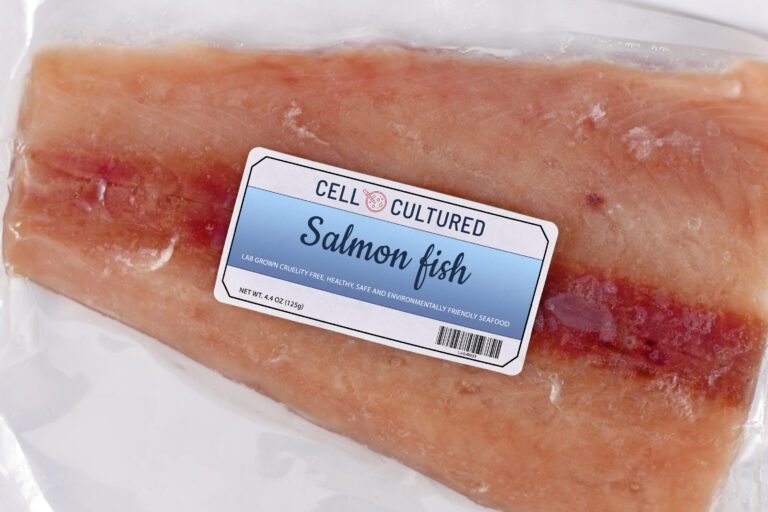Embracing Alternative Seafood for a Sustainable Future
Asma Jarad
IF YOU FIND YOURSELF CRINGING AT THE THOUGHT of “alternative” and “seafood” in the same sentence, you are not alone! However, as we face an increasing global demand for seafood and challenges with environmental sustainability, it’s time to accept alternative seafood for what it is: a viable and ethical solution.
Let’s explore the revolutionary concept of alternative seafood that promises to redefine our relationship with the ocean’s bounty while navigating the pressing need to alleviate the strain on our marine ecosystems. By the end, we’ll discover the potential of alternative seafood to offer nutritious, ethical, and sustainable choices.
Understanding Alternative Seafood
Alternative seafood breaks away from traditional fishing practices, relying instead on innovative techniques. This developing category currently offers three production approaches, each with its own merits:
Convincing consumers to switch to alternative seafood is also challenging due to the perception that these alternatives differ from traditional seafood in taste and texture.
As human populations continue to grow, so does the global projected reliance on fish. According to the Food and Agriculture Organization of the United Nations (FAO), aquatic animal production is projected to grow 14% by 2030 compared to 2020. As you might expect, traditional fishing methods cannot sustain this human demand for seafood. Alternative seafood presents a promising avenue for scaling seafood production and delivering high-quality protein.
Environmental & Human Impact
A survey on marine threats and impacts by Sturla Kvamsdal et al. for Marine Policy revealed that global threats and impacts in marine environments are “overfishing, climate change (global warming, ocean acidification), pollution (plastics), and habitat damage.” These issues underscore the need for more sustainable seafood options.
Concerns about the mistreatment of marine life in industrial fishing practices have also pushed consumers to seek ethical alternatives. Bycatch and trawling are common examples of harmful behavior. Bycatch, for instance, captures not only the desired seafood for human consumption but also dolphins and turtles. Similarly, trawling, as indicated by the Coastal and Marine Hazards and Resources Program, is a lethal fishing practice that “destroys the natural seafloor habitat by essentially rototilling the seabed. All of the bottom dwelling plants and animals are affected, if not outright destroyed, by tearing up root systems or animal burrows.”
More alarming are the reports of human rights abuses, specifically forced labor in the seafood industry. According to research done by Trevor Sutton and Avery Siciliano in their article “Seafood Slavery,” “human trafficking related to the seafood sector has been documented in countries and markets as diverse as New Zealand, Thailand, Ghana, Ireland, and—most recently—U.S.-registered fishing vessels docked in Hawaii.” Workers, which sometimes include children, are forced to work long hours in poor conditions with little or no pay. In the U.S., there are reports of migrant workers being subjected to work on vessels or in seafood processing plants under harsh conditions by threat of deportation.


Embracing alternative seafood is also crucial in fulfilling our responsibility to care for our planet and its inhabitants, as we are God’s elevated creation entrusted with maintaining balance and acting with moderation, thoughtfulness, and justice.
Challenges for the Emerging Alternative
Despite the promise of alternative seafood, several challenges exist, including regulatory concerns regarding safety standards and labeling, emphasizing the need for stringent quality requirements. Convincing consumers to switch to alternative seafood is also challenging due to the perception that these alternatives differ from traditional seafood in taste and texture. In a Telegraph article, Sue Quinn asserts, “Fishless fish has lagged behind mock meat in popularity for a variety of reasons. Seafood is widely regarded as healthy, so consumers aren’t inclined to give it up as readily as they are red meat…”
Protecting Allah’s Creation
Shifting toward alternative seafood is a necessary evolution in our dietary practices to ensure a sustainable future. Alternative seafood offers promising solutions to the urgent challenges posed by traditional seafood production, including the critical issues of overfishing, biodiversity loss, ecosystem damage, and human suffering. While challenges exist, the increasing awareness and adoption of alternative seafood highlights a collective move toward a more ethical and sustainable relationship with our oceans, environment, and workers’ rights.
Embracing alternative seafood is also crucial in fulfilling our responsibility to care for our planet and its inhabitants, as we are God’s elevated creation entrusted with maintaining balance and acting with moderation, thoughtfulness, and justice. Let us recall God’s words: “O children of Adam…eat and drink, but be not excessive. Indeed, He likes not those who commit excess” (Quran 7:31).
Indeed, God created a perfectly balanced world based on sustainability and circularity.
ASMA JARAD is a Chicago writer, editor, and communications strategist. Her diverse work spans platforms encompassing health, food trends, and Islam in America.